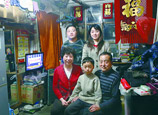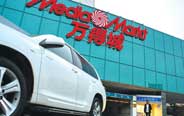
The new rules will cut the fees by 20 percent and reduce income to lenders by 7.5 billion yuan ($1.2 billion), the central bank said.
Chow said Citi's emphasis on its credit card business comes from the still-limited network in the economy, as well as Citi's possible cross-selling opportunities for other products such as insurance and unsecured loans.
"We still believe the returns from issuing credit cards will exceed the investment," Chow said.
"Due to current policies, we could only establish as many as 26 outlets in China a year, but credit cards could bring more clients by combining our advantage of a good network channel. It is key to our consumer banking strategy."
The bank has also applied to be in the first batch of foreign lenders allowed to sell local mutual funds, and it expects to explore combined products that sell both domestic and overseas funds.
The largest credit card issuer in the Asia-Pacific region said the Chinese market will become the world's largest for credit cards within the next decade. "Normally, the credit card business will break even in four to five years. I expect our exploration in China could surpass such a pace," Chow said.
According to the central bank, China's purchases with bank cards was 20.8 trillion yuan in 2012. Credit card lending stood at 3.5 trillion yuan during the same period, which 1.1 trillion yuan was unpaid.
Citi was the first international bank to issue its own solely branded credit card in the Chinese mainland. The launch marked a "milestone" for Citi's presence in China, Au said.
He said Citi China's performance last year was better than that overall by foreign banks, and its headcount has increased compared with a year earlier.
Citi announced in December it will slash 11,000 jobs globally, or 4 percent of its total workforce, to trim costs. About 6,200 jobs will come from Citi's consumer banking unit.

















 Village teacher with his back basket
Village teacher with his back basket


![]()
